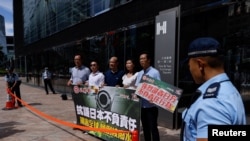The operators of Japan’s Fukushima nuclear plant will begin releasing thousands of liters of treated radioactive wastewater from the wrecked facility into the sea on Thursday.
Prime Minister Fumio Kishida announced Tuesday that he gave Tokyo Electric Power Company permission to begin the process, depending on weather conditions.
The plant has been inoperable since March 11, 2011, when a 9.0-magnitude earthquake triggered a tsunami that swept across northeastern Japan before reaching Fukushima prefecture.
The high waves knocked out the plant’s power supply and cooling systems and led to a meltdown of three reactors, sending massive amounts of radiation into the air and forcing the evacuation of hundreds of thousands of residents, making it the world’s worst nuclear disaster since the 1986 Chernobyl accident.
The now-tainted water had been used to cool the nuclear fuel rods after the disaster. Japan says the water has been diluted to levels well-below international standards and will be slowly released into the ocean over several decades.
During a visit to Japan last month, Rafael Grossi, the head of the U.N.’s International Atomic Energy Agency, said the plan to release treated radioactive wastewater from Fukushima adhered to global safety standards and “would have a negligible radiological impact on people and the environment.”
But Japanese fishing organizations have come out strongly against the plan, saying it would damage their reputation among Japan’s neighbors over concerns of possible contamination of fishing waters near Fukushima.
South Korea and China have also raised objections to the release of the radioactive wastewater, with Beijing going so far as to ban seafood imports from several Japanese prefectures and putting imports from other locations through radiation testing.





